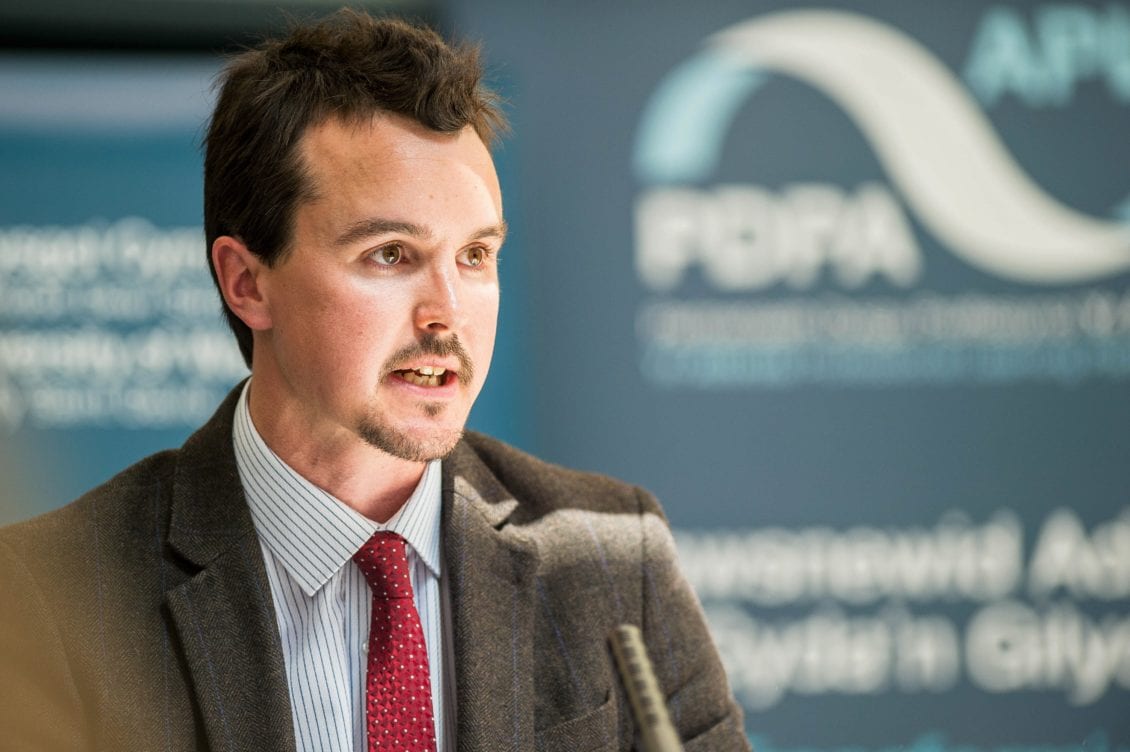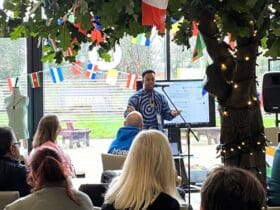With the discussion about pupils’ return to school ever-present in the media, Gareth Evans, Director of Education Policy at the University of Wales Trinity Saint David’s Yr Athrofa: Institute of Education and Humanities looks at the challenges that lie ahead for schools, their teachers and the new curriculum in Wales.
In what has become a weekly tradition, Wales and the rest of the UK comes together each Thursday to Clap For Our Carers. A small, but heartfelt tribute to those working to keep us alive, and safe from serious illness. But to some extent, the heroic fightback against coronavirus is only possible because of our education system. Schools have remained open for the duration of the pandemic, to care for the children of key workers. Without them, our NHS would have malfunctioned.
Teachers, leaders; cooks and cleaners; whatever their role, school staff have kept the wheels turning. They’ve have made daily video calls and written messages of hope and encouragement to pupils beset by worry. They’ve knocked on doors to make sure children are coping, and hand-delivered Easter eggs to lift the spirits. Not to mention the design, development and distribution of personal protective equipment.
These people have their own families, their own fears and their own vulnerabilities. Yet they reach out, not because they’ve been told to do it – but because they care.
Don’t be fooled by the locked gates and empty car parks. Education continues, albeit in a different way. Roles and responsibilities have been reapportioned, and learning shifted online. Work is set remotely and feedback given via email – decades-old structures have been broken, perhaps irreparably. Timetabling, seating plans, examinations – so many of our established routines have been cast aside, such is the immediacy of the task in hand.
What our education workforce has done to reshape the very essence of our schools in this, our hour of great need, is nothing short of remarkable.
Consider too that the transition from classroom to computer happened almost overnight. There was no time for planning, preparation and assessment on this occasion.
My mind is drawn back to mid-March, shortly before lockdown, but after many workplaces had shut in readiness for what was about to happen.
Though self-isolation was rife, our schools continued to open, more often than not, on a skeleton staff. It was not until our Education Minister, Kirsty Williams, pulled the proverbial shutters down that teaching and learning went remote.
It is almost incomprehensible that the very fabric of our society has been disturbed in quite so big a way, quite so quickly. And of course, there have been significant challenges.
The wide variation in access to resources and connectivity to support online learning, is hugely problematic. A crude assessment of current levels of engagement would be that some are, some aren’t and some can’t.
The Welsh Government and colleagues have, to their credit, been working hard to furnish Wales’ virtual learning platform, Hwb, with materials to support children stuck at home.
However, the announcement that Microsoft Office and Google education tools ‘are available to all families’ will be of scant consolation to those who have no means of getting online in the first place.
One headteacher told me of the challenges they are facing trying to get pupils who share a mobile phone with the rest of their household, remotely engaged in learning. How can those families possibly begin thinking about the plethora of resources published on Hwb? Additional funding to support ‘digitally excluded’ learners in Wales is to be welcomed, but there’s little doubt we are playing catch-up.
Making up for lost time is almost certain to be the biggest challenge facing Wales’ education system in the coming months and years.
Some children will have gone 8 weeks and counting with no access to online learning, and there is little doubt that those from more deprived backgrounds will have fallen further behind their more affluent peers. Talk of a ‘lost generation’ is entirely legitimate and the widening of the attainment gap should be a worry for us all.
On their return to school, a thorough evaluation of pupils’ progress (or otherwise) during lockdown will be needed, and learning programmes tailored to individual need. We need to start thinking about the areas that require most attention, and how to regain lost ground. And of course, the health and wellbeing of all concerned will need careful and sensitive assessment.
From an educational perspective, if there is any good to come out of this crisis, it’s that teachers have got to spend more time with their own children. Side from breakfast and bed times, human contact is at a premium normally, and so lockdown can have its benefits. But there is recognition that we cannot go on like this forever, and online, blended learning will never be a substitute for the intimacy of face-to-face teaching. Classrooms in the cloud are better than no classrooms at all, but they cannot replicate the personal interaction that a pupil has with their peers.
Learning is, after all, a largely social affair – and it is little wonder that so many children and young people are struggling to adapt to new ways of working.
Schools are all about structures – and with no agreed framework for online learning, pupils have been left to their own devices. If technology is to play more of a part in children’s education moving forward, we will have to consider the terms of engagement, and lay out a blueprint of what teachers, pupils and parents can come to expect.
We don’t yet have a shared understanding of remote learning, as we do the education system to which we have become accustomed. That, though, is a conversation for another day as attention now turns to the restarting of our economy and, with it, the reopening of our schools.
There are more cars on the road, more people going to work. Trips to the beach are a no-no, but for how much longer? Certain pockets of society are getting restless and the political establishment is getting twitchy.
Home-schooling was novel at the start, but keeping children from computer games, television and the myriad of other distractions is becoming more of a challenge.
Responding to a situation of this nature was never going to be easy, and in the absence of a silver bullet, we need to build some sort of consensus around what happens next. Effective communication is at a premium, and it is inevitable in times of crisis that we turn to those with power and responsibility for direction.
The response of our politicians to the coronavirus outbreak has been nothing if not mixed. Some political leaders have been bolshie and bombastic, others dithering and ponderous. Yet each is working on the basis that schools are the key to resuming any semblance of normal life. There is, however, some disagreement as to when schools should return on a more formal basis.
Each of the devolved governments of the United Kingdom is taking their own decisions, based on what is right for their own people. Naturally, this is entirely appropriate – and the very essence of what our distinct governance structures are designed to do. But it is becoming increasingly clear that when schools do reopen, they will not resemble the schools of old, wherever in the UK they may be. This is, of course, because coronavirus will still be very much a part of our lives, for the short-term, at least. And while that remains the case, there will be a risk. A risk of contagion; a risk of serious illness.
For all our Education Minister’s warm words and reassurance, she cannot guarantee all schools, will be safe to all pupils, and all staff. This simply isn’t in her gift. All she can realistically do is mitigate the risks as far as is humanly possible, and act on the best advice of the scientific experts she has at her call.
Schools in England are being primed for a return in early June. A staggering of intake and fewer members of staff will make social distancing more manageable, but it will not by itself shut down the threat of coronavirus. Meanwhile, schools in Wales are on standby. There are no immediate plans to open up to larger groups of children, and headteachers have been promised three weeks’ notice of any meaningful change.
If a return next month is considered too soon and not in the best interests of the wider population, it may be that we have to look more creatively at the summer holiday period – and what tweaks could be made to negate learning time lost to pupils.
Now I’m not suggesting that teachers should have their well-earned time off taken from them – by goodness they need a break more than most.
But in order to give some of our pupils in most need more time in the classroom, we could perhaps explore the possibility of bringing school holidays forward to accommodate certain year groups. Pupils in Year Six who are preparing for secondary school, as well as those preparing for GCSEs and A-levels, might be the first to get the call.
I wonder too what role there is for universities and colleges – for assuming students in further and higher education are more adept at distance learning, and are therefore less likely to race back into the lecture theatre, there will be specialist learning spaces sitting dormant right across the country. If schools aren’t big enough to accommodate the desired number of learners, there may be alternatives worth pursuing.
All of this, of course, assumes that pupils are willing and able to go back to school… those living with parents or grandparents in the ‘at risk’ categories may choose to stay at home, and many teachers will be inclined to do the same.
Many of you will have seen the heartbreaking pictures of early years children in France sitting alone on the ground in so-called ‘isolation sections’…Chalk-marked squares on the playground denoting where a child could and couldn’t play. The thought of berating our youngest pupils for quite literally stepping out of line is something no teacher would want to comprehend.
Whatever the permeations, honesty is the best policy – and we need to be straight with our educators, even if it’s not exactly what they wanted to hear.
I’d like to conclude with a look to the future and the longer-term vision for education in Wales.
A report commissioned by the Welsh Government and published in September 2018,called for an urgent review of how schools in Wales operate.
A team led by Professor Mick Waters recommended that a major commission be established to ‘re-imagine schooling’ and ‘think afresh about how schooling works for pupils, their families and their teachers’. A five-strong panel was duly convened last July, but I don’t recall seeing anything tangible shared publicly since.
It is ironic that it has taken a global pandemic to bring Waters’ prophetic sentiments about re-imagining schooling to the fore.
Truth is, of course, we need now to re-imagine society as a whole. We must reflect on what is important, our foremost priorities and whose contributions we really value. Now is the time to step back, catch our breath and reassess what really matters. And yes, that includes looking again at our new Curriculum for Wales and wider reform agenda.
That does not mean ripping up and starting afresh, and it may well be that much of what we have been working towards in Wales is as, if not more, applicable in the current climate.
Indeed, the new curriculum, on which our reform agenda is based, has at its heart a lasting commitment to health and wellbeing, individual learning journeys and high aspiration for all – components that we would seek to retain, whatever the circumstances.
The Curriculum for Wales, by its very nature, is a vision on a new approach to schooling and it is difficult to disagree with the tone and tenor of what is writ large in its guiding document. Nevertheless, the context in which all education policy was drawn makes it open to careful examination.
If the world has indeed changed beyond all recognition, and it is assumed the education system to which we will return will be poles apart from that which we left, then perhaps we should draw a line in the sand.
We need to ask ourselves, what is relevant and what is not? What have we missed? And what, with the benefit of hindsight, could we do without?
Mass testing, high-stakes accountability, endless red tape and bureaucracy… There is so much open to debate and discussion, and we cannot let the chance to fundamentally change the way in which we work pass us by. There has been too much suffering and loss to slip back quietly into old habits. And besides, with the mother of all recessions looming large on the horizon, we are going to have to do things differently, regardless.
Funding for curriculum development, professional learning and education more generally will be scarce, if it wasn’t already.
But with great challenge comes opportunity… and we owe it to our children and young people to move forward to a brighter future, that better meets the needs of all our learners, together…
Listen to the Gareth Evans delivering this piece as part of UWTSD’s Perspectives podcast series on Spotify, iHeartRadio, Deezer and Apple Podcasts.








Leave a Reply
View Comments